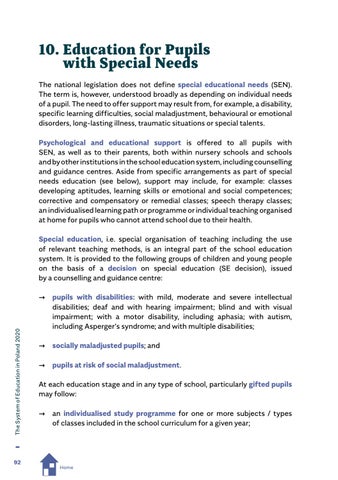10. E ducation for Pupils with Special Needs The national legislation does not define special educational needs (SEN). The term is, however, understood broadly as depending on individual needs of a pupil. The need to offer support may result from, for example, a disability, specific learning difficulties, social maladjustment, behavioural or emotional disorders, long-lasting illness, traumatic situations or special talents. Psychological and educational support is offered to all pupils with SEN, as well as to their parents, both within nursery schools and schools and by other institutions in the school education system, including counselling and guidance centres. Aside from specific arrangements as part of special needs education (see below), support may include, for example: classes developing aptitudes, learning skills or emotional and social competences; corrective and compensatory or remedial classes; speech therapy classes; an individualised learning path or programme or individual teaching organised at home for pupils who cannot attend school due to their health.
The System of Education in Poland 2020
Special education, i.e. special organisation of teaching including the use of relevant teaching methods, is an integral part of the school education system. It is provided to the following groups of children and young people on the basis of a decision on special education (SE decision), issued by a counselling and guidance centre:
92
→ pupils with disabilities: with mild, moderate and severe intellectual disabilities; deaf and with hearing impairment; blind and with visual impairment; with a motor disability, including aphasia; with autism, including Asperger’s syndrome; and with multiple disabilities; → socially maladjusted pupils; and → pupils at risk of social maladjustment. At each education stage and in any type of school, particularly gifted pupils may follow: → an individualised study programme for one or more subjects / types of classes included in the school curriculum for a given year;
Home

